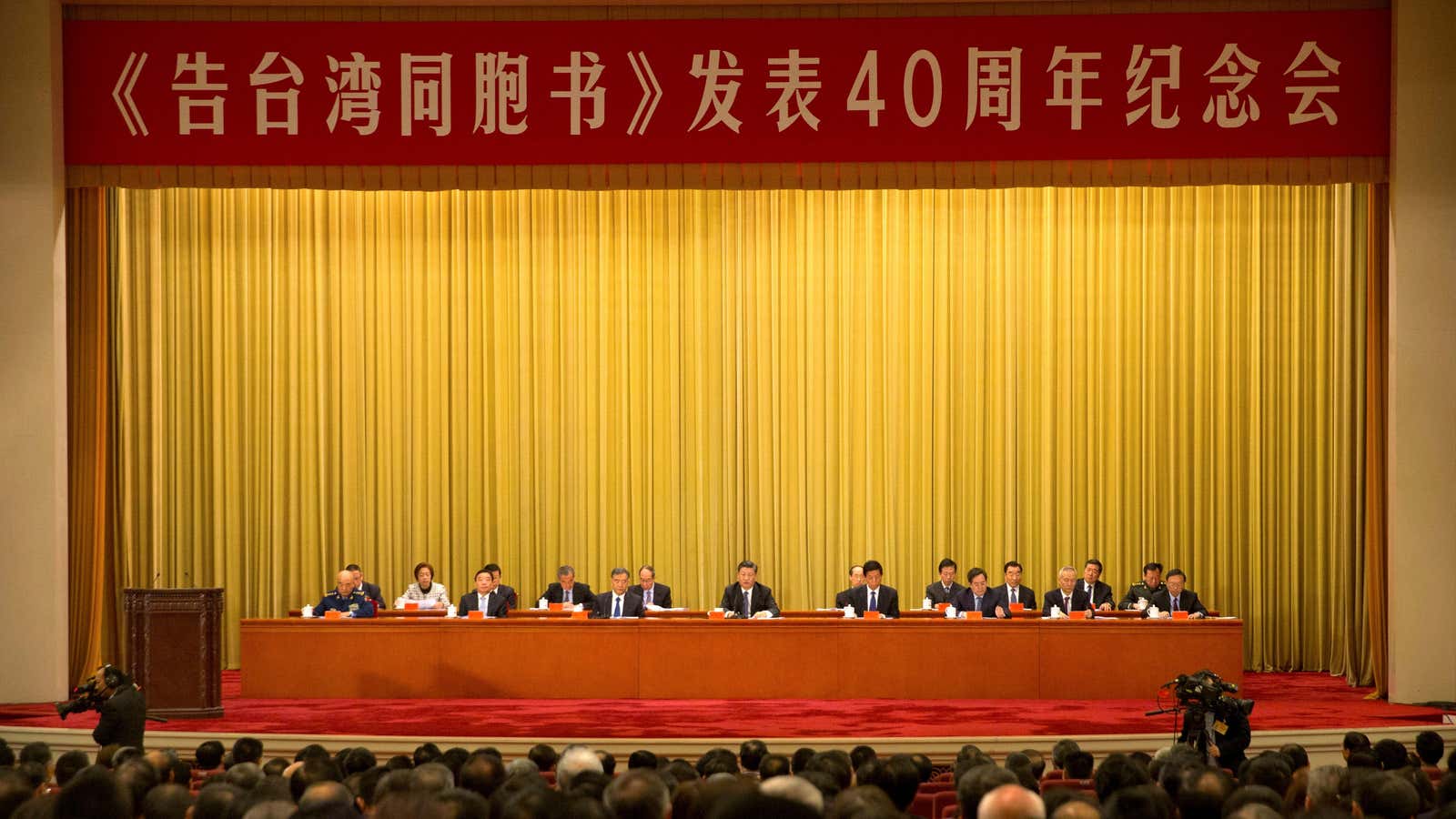In a speech (link in Chinese) delivered by Xi Jinping today (Jan. 2) to the people of Taiwan, the Chinese president extended his warmest wishes in the new year to his “compatriots,” “family,” and “friends”—while also warning that China would not rule out the use of force over unification.
Xi’s speech fell on the 40th anniversary of an important date in cross-strait relations. On Jan. 1, 1979—also the date when the US established diplomatic ties with China—Beijing said in a “Message to Compatriots in Taiwan” that it would cease the routine bombardment Taiwan’s offshore islands, including Kinmen (also known as Quemoy). Military confrontations between the two sides had not ceased with the relocation of Nationalist forces from China to Taiwan in 1949 with the Communists’ victory in the Chinese Civil War. Since then, China has maintained that Taiwan is an inseparable part of its territory, though Taiwan has been self-governed in that time and, more recently, democratically ruled.
Today’s address, heavily infused with nationalistic and emotional appeals, strongly echoed the tone of the 1979 open letter. Xi’s speech included a sweeping overview of modern Chinese history, invoking the Opium Wars and the country’s long history of invasion and interference by Western powers—an obvious reference to what Beijing sees as the US’s increasing support (paywall) of Taiwan’s government under president Donald Trump.
Xi said that the seven-decade-long separation of China and Taiwan, too, was the result of such foreign interference, and called for the matter to be settled “between family members.” Unification, he said, would bring “lasting peace” and prosperity for Taiwan, even promising that their private property, way of life, and religious freedom would be protected under the “One Country, Two Systems” framework currently in operation in Hong Kong—hardly an inspiring option for many Taiwanese looking askance at the deteriorating environment for freedoms of all kinds in the Chinese territory.
Even as Xi stated that “Chinese people would never fight Chinese people,” he also warned that China would not renounce the option of using force to unify with Taiwan, though he said that the threat was only targeted at “external forces” and those pushing for Taiwan’s independence. Late last year, Xi ordered the Chinese military command that monitors the South China Sea and Taiwan to be combat ready.
Though many Taiwanese do not self-identify as being Chinese and instead support a separate Taiwanese identity, many are reluctant to push for bold moves in the direction of independence that might invite a military response from China. That’s prompted Taiwanese to assert their own identity in the international arena in other ways, such as a referendum held in November on whether Taiwan should be able to compete in the 2020 Olympics as “Taiwan” rather than “Chinese Taipei”—a motion that was ultimately defeated.
For many China watchers, little of the content in Xi’s speech was new, particularly as Beijing has stepped up its hostile rhetoric against Taiwan since president Tsai Ing-wen, whose party espouses pro-independence views, came to power in 2016. The timing of the speech, however, comes at a particularly interesting time when Tsai may be seen to be in a position of weakness, after her ruling party suffered devastating losses at the hands of the more China-friendly opposition Kuomintang party in local elections in November. Many saw that outcome as a boon to Beijing’s ambitions. Tsai had warned ahead of the elections that China was spreading fake news to interfere in the process.
Xi didn’t specifically refer to the recent elections in Taiwan, but boasted that China had achieved a series of “series of victories” in the fight against Taiwan independence.
In her own New Year’s Day address, Tsai said that the election results did not mean that Taiwanese people were willing to abandon their sovereignty, and once again stressed the need for Taiwan to remain vigilant about disinformation from China.
With more cities and counties now under Kuomintang control, economic, cultural, and political exchanges between Taiwan and China are expected to increase this year, particularly as the number of tourists from mainland China to Taiwan has plummeted since 2016—though even with China’s restrictions on tourism, Taiwan still managed to post a record number of arrivals in 2018.




